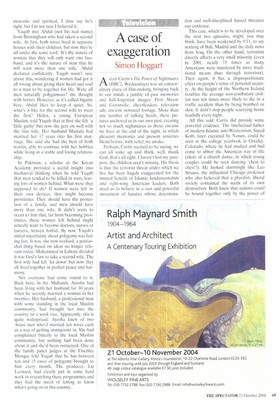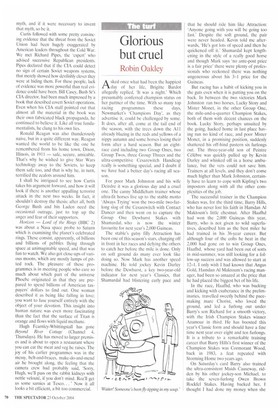A case of exaggeration
Simon Hoggart Adam Curtis's The Power of Nightmares (BBC2, Wednesdays) was an extraordinary piece of film-making, bringing back to our minds a jumble of past memories and half-forgotten images: Perry Mason and Gunsmoke, cheerleaders, television ads, ancient newsreel footage. More than any number of talking heads, these pictures anchored us in our own past, creating not so much nightmares as those dreams we have at the end of the night, in which pleasant memories and present anxieties blend before, with relief, we awake.
Perhaps. Curtis seemed to be saying, we can all wake up and think, well, thank God, that's all right. I haven't lost my passport, the children aren't missing. His thesis is that the terrorist threat under which we live has been hugely exaggerated for the mutual benefit of Islamic fundamentalists and right-wing American leaders. Both need us to believe in a vast and powerful movement of fanatics whose determina
tion and well-disciplined hatred threaten our existence.
This case, which is to be developed over the next two episodes, might, you may think, have been weakened by 9/11, to say nothing of Bali, Madrid and the daily news from Iraq. On the other hand, terrorism directly affects a very small minority (even in 2001, nearly 15 times as many Americans were murdered by more traditional means than through terrorism). Then again, it has a disproportionate effect on people's sense of personal security. At the height of the Northern Ireland troubles the average non-combatant civilian was ten times more likely to die in a traffic accident than by being bombed or shot. It didn't stop people scurrying home fearfully every night.
All this said, Curtis did provide some powerful evidence. The intellectual father of modern Islamic anti-Westernism, Sayer] Kotb, later executed by Nasser, could be seen in the college yearbook in Greeley, Colorado, where he had studied and had come to abhor the American way of life (shots of a church dance, in which young couples could be seen dancing 'chest to chest'). He looked alarmingly like Leo Strauss, the influential Chicago professor who also believed that a pluralist, liberal society contained the seeds of its own destruction. Both knew that nations could be bound together only by the power of myth, and if it were necessary to invent that myth, so be it.
Curtis followed with some pretty convincing evidence that the threat from the Soviet Union had been hugely exaggerated by American leaders throughout the Cold War. We met Richard Pipes, the 'expert' who advised successive Republican presidents. Pipes declared that if the CIA could detect no sign of certain Soviet weapons systems, that merely showed how devilishly clever they were at hiding them. For these people, lack of evidence was more powerful than real evidence could have been. Bill Casey, Bush Sr's CIA director, had been much impressed by a book that described covert Soviet operations. Even when his CIA staff pointed out that almost all the material in the book was their own fabricated black propaganda, he continued to believe it. Like all true fundamentalists, he clung to his own lies.
Ronald Reagan was also thunderously naive, but in a quite different way. Reagan wanted the world to be like the one he remembered from his home town, Dixon, Illinois, in 1911 — safe, secure, amicable. That's why he wished to give Star Wars technology away to the Soviets, to keep them safe too, and that is why he, in turn, terrified the zealots around him.
I shall be intrigued to see how Curtis takes his argument forward, and how it will look if there is another appalling terrorist attack in the next two weeks. In fact, it shouldn't destroy the thesis; after all, both George Bush and bin Laden need the occasional outrage, just to top up the anger and fear of their supporters.
Horizon — Lord of the Rings (BBC 2) was about a Nasa space probe to Saturn which is examining the planet's celebrated rings. These consist, apparently, of billions and billions of pebbles flying through space at unimaginable speed, and that was fun to watch. We also got close-ups of various moons, which are mostly lumps of pitted rock. The pleasure of these programmes is in meeting people who care so much about which part of the universe Phoebe originated in that they are prepared to spend billions of American taxpayers' dollars to find out. One woman described it as being like falling in love; you want to fuse yourself entirely with the object of your devotion. This insight into human nature was even more fascinating than the fact that the surface of Titan is orange and flows with liquid methane.
Hugh FearnIcy-Whittingstall has gone Beyond River Cottage (Channel 4, Thursdays). He has moved to larger premises and is about to open a restaurant where you can eat the meat and veg he raises. The joy of his earlier programmes was in the messy, belt-and-braces, make-do-and-mend air he brought along, the feeling that the camera crew had probably said, 'Sorry, Hugh, we'll pass on the rabbit kidneys with nettle veloute, if you don't mind. Roz'll get us some sarnies at Tesco... ' Now it all looks a bit efficient, a bit too commercial.

























































































 Previous page
Previous page